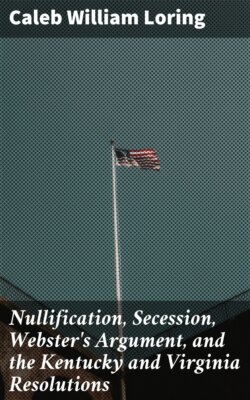Читать книгу Nullification, Secession, Webster's Argument, and the Kentucky and Virginia Resolutions - Caleb William Loring - Страница 3
На сайте Литреса книга снята с продажи.
PREFACE.
ОглавлениеTable of Contents
I was much shocked a few years ago, in reading a Life of Webster, by the statement of its able and distinguished author that really Hayne had the right of the argument in the renowned debate on nullification. In reply I prepared a statement of Webster’s argument. Besides what Webster had so ably said, I found in the Constitution itself other proofs of the nationality of our government, of the intent of those who made it to establish a nation, of their full belief that they had done so, and that, historically, there was no contention as to this.
The vital question is whether a national union was established by the States, or a confederacy of independent nations formed with the right of each to decide upon the validity of the acts of the General Government and leave it at its pleasure.
The superiority in men and wealth that gave the North the victory did not decide the right or wrong of secession: it may have shown its impracticability; but if the right ever existed it remains to-day.
There are many authors who have at great length discussed this matter on the side of the South, but the case of the North, it seems to me, has not been fully set forth. The idea appears to be creeping into history, a recent fad of some Northern writers and commentators, that the nationality of our government was a question from its inception, and that the United States Judiciary and Congress by assumptions have largely extended its powers.
The nation, as Pallas Athene full grown and armed from the brain of Zeus, sprang to life from the Constitution with the sovereign authority necessary for its existence and the power to enforce its rule. In the beginning there was no debate, no question of its nationality. The early commentators on the Constitution (and Story wrote three volumes upon that matter) did not even mention that there was a doubt of it.
To those who so often quote the Kentucky resolutions, it will perhaps be a matter of surprise to learn that their purport and existence were forgotten from the time they were promulgated until South Carolina’s threat in 1830 of nullification.
That Virginian of Virginians, Patrick Henry, who so strenuously opposed his State’s adoption of the Constitution, struck the keynote, when he objected that it was “We, the people,” and not “We, the States,” that made the government. Later, when convinced of the wisdom of the adoption, and Virginia had shown by its resolutions its objections to the Alien and Sedition laws, and discontent at the rule of John Adams and the Federalists, he no less forcibly declared that Virginia owed an obedience to the laws of the United States.
It will be new to many that the Virginia resolutions do not in the least countenance the doctrine of secession and nullification: that the resolutions and explanations of them by the Virginia Legislature testify to an attachment and love of the Union, and a professed intent to strengthen and perpetuate it, and are, as they declare, only a protest against the assumption by the government of undelegated power.
In the belief that the right and might both prevailed in our civil war, and in full trust in that faith, these remarks are submitted to the people of our whole country.
Caleb William Loring.
